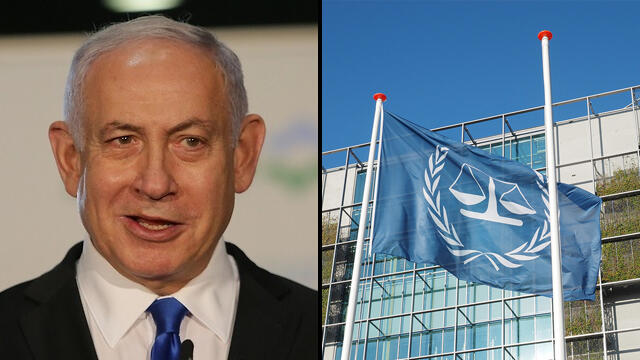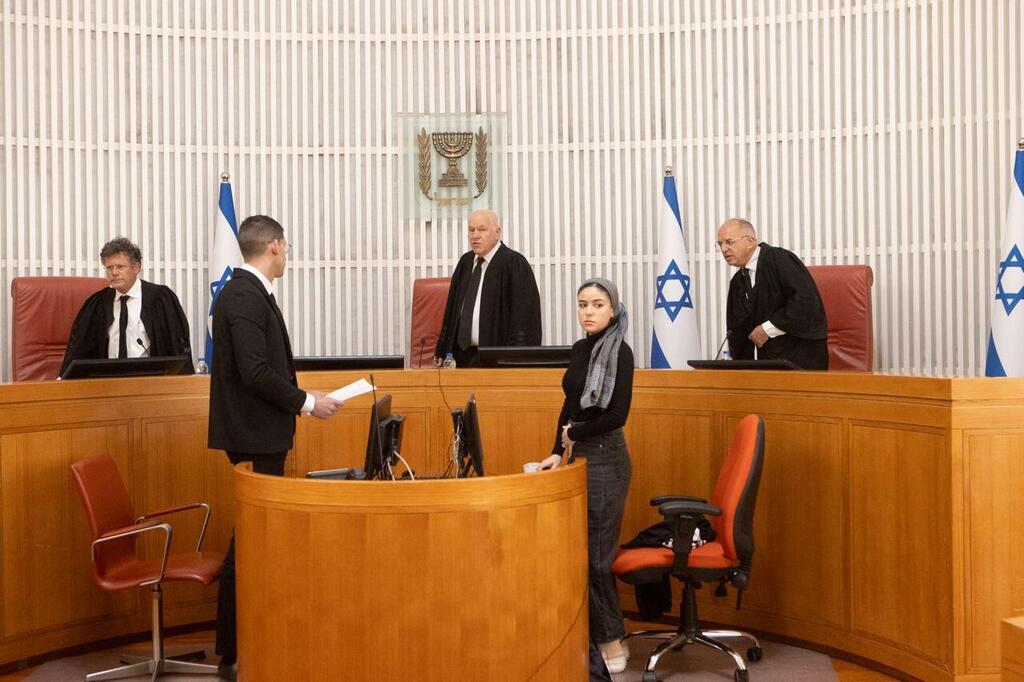Getting your Trinity Audio player ready...
The prosecutor of the International Criminal Court in The Hague is seriously considering requesting the court to issue arrest warrants against senior Israeli officials, including Prime Minister Benjamin Netanyahu. If indeed true, this is no less than an earthquake.
The International Criminal Court has never before issued arrest warrants against government or military officials in democratic countries. The only heads of state who have been disgraced with international arrest warrants are the deposed President of Sudan Omar al-Bashir, former Libyan ruler Muammar Gaddafi and Russian President Vladimir Putin.
3 View gallery


Prime Minister Benjamin Netanyahu and The International Criminal Court in The Hague
(Photo: Alex Kolomoisky, Shutterstock)
It is important to note that Israel is not Sudan, Libya or Russia. Israel is a democratic country guided by the fundamental principle of the rule of law. Indeed, Israel is not a perfect democracy; it is not devoid of its fair share of internal and external challenges. That said, Israel in no way resembles any of the countries or organizations the leaders of which the International Criminal Court has issued arrest warrants in the past.
The prosecutor of the court, Karim Khan, is not an enemy of the State of Israel. I have met him several times in the past. He is a serious person; an experienced and senior British jurist, who unlike his predecessors has gained professional respect in the international legal arena. Respected as well are the special advisers he appointed to handle the Israeli-Palestinian case – Andrew Cayley and Brenda Hollis. The first served recently as Britain's Director of Service prosecutions and before that as co-prosecutor at the Extraordinary Chambers in the Courts of Cambodia.
The second is a former U.S. Air Force officer (at the rank of colonel), who, in her past, led the prosecution at the Special Court for Sierra Leone. The fact that Khan chose to include them in the Israeli-Palestinian case and that these senior prosecutors agreed to take on the role, reveals the level of importance that both the prosecutor and the special advisors attribute to the case.
Israeli senior political and legal officials are right to approach the challenge posed by the court with the utmost seriousness. Despite the smug attitude emanating from certain parts of the political system, Israel is not a global power. Our security system is not omnipotent. A decision to cease selling us weapons, or to refrain from cooperating with us on security matters, is not simply a minor inconvenience.
This is true not only in terms of security but also concerning the economy. We are a small country. The ability to maintain a high standard of living in Israel is highly dependent on the world's willingness to conduct trade with us. The imposition of significant economic sanctions on Israel would severely damage the Israeli economy, and the effects would undoubtedly be felt by every citizen here.
As such, the issuance of arrest warrants would not only impose restrictions on the officials against whom they are issued but may also set in motion embargoes and boycotts against Israel.
From a professional standpoint, it ought to be noted that the prosecutor at The Hague would face not-so-simple legal challenges, should he indeed consider issuing arrest warrants against Israeli senior officials.
First, there exist substantial doubts concerning the court's jurisdiction concerning the Israeli-Palestinian conflict. Although a panel of judges held (by two to one majority) that the conflict falls within the court's jurisdiction, numerous senior jurists around the world have opined that the minority opinion was more persuasive than the majority's (in my view, superficial) opinion. It remains uncertain how the Appeals Chamber will rule on this issue if, and when, it is required to do so. In any event, the alleged offenses, which, according to reports, the prosecutor wishes to pursue, apply according to the Rome Statute only to conflicts between states. It would take a great degree of artistic license with the law to categorize the conflict between Israel and Hamas as such.
Second, there exists a chasm between how Israeli policy is reflected externally (due, in great part, to horrendous statements made by some of our elected officials and the arrogant and - for lack of a better word - dumb videos published by IDF soldiers), and the actual directives and commands issued by the Cabinet and the military ranks throughout the chain of command.
A third challenge may be added to this list, and that is the fact that Israel has a professional and independent legal system that can investigate, and is investigating, many cases involving alleged violations of international law, in a manner that puts into question whether the complementarity principle has been given due consideration.
So what can be done? Politically, it is essential to alter the negative perceptions of Israel in the international arena. The prosecutor may have gained the impression, perhaps, from statements made in Western capitals and decisions of the judges of the International Court of Justice, that his support base (western countries and senior international law jurists) expects him to contribute to efforts to restrain Israel.
It is crucial that (to the extent possible) our allies clarify their reservation regarding the seeping of critical discourse against Israel into the international criminal law arena. This does not mean that Israel should relinquish its vital interests, but whenever possible, as in the case of the UK government's request to allow detainee visits, efforts should be made to keep our allies by our side.
Secondly, on the legal front, it is essential to publish or to directly or indirectly relay to the prosecutor reliable information concerning how Israel operates and about the inquiries and investigations already underway there. Khan, who is both professional and senior, undoubtedly won't be keen on issuing unsubstantiated arrest warrants when the eyes of the justices and the international community are upon him. Meanwhile, he appears to be primarily fueled by partial and one-sided sources. From my experience with international and state prosecutors, once they are exposed to the accurate state of things, they can be persuaded that there is no room for the initiation of criminal proceedings.
Given the concern expressed by the prosecutor in his past speeches concerning the humanitarian situation in the Gaza Strip, particular attention ought to be given to the currently pending proceedings before Israel's High Court of Justice about Israel's policy concerning the supply of humanitarian aid to the Gaza Strip.
The judgment of the High Court of Justice, which is held in high regard by the International Criminal Court, will undoubtedly be carefully studied by the latter. One can only hope that the High Court of Justice will not excessively delay its final decision and that it will analyze the issue not only from the perspective of Israeli law but also from the standpoint of international law (as the court has done in numerous instances in the past).
Finally, it is worth considering the possibility of requesting that the prosecutor defer the examination and investigation process in favor of Israel. The ICC's statute is founded upon the concept of complementarity; that is, the provision of priority to states that are willing and able to investigate allegations raised against their citizens or regarding actions undertaken within their territory. Karim Khan himself understands well the quality of the legal system in Israel.
 Dr. Roy SchondorfPhoto: Facebook
Dr. Roy SchondorfPhoto: FacebookJust a few months ago, he expressed that "Israel has trained lawyers who advise commanders and a robust system intended to ensure compliance with International Humanitarian Law." Such a statement may not be regarded as merely a casual opinion when expressed by an international prosecutor. If the State of Israel declares that it is willing to investigate the allegations raised against it, it will be difficult for the prosecutor to deny this request.
Should it be required to establish in Israel a designated mechanism for this purpose – in the form of an investigative committee headed by a judge – it would be advisable to do so. Admittedly, it would not be a simple feat from a public perspective to appoint a body charged with investigating the conduct of political and military policymakers; however, if the prosecutor indeed believes that there is a sufficient evidentiary basis for issuing arrest warrants, it would be preferable, from an Israeli perspective and, in my view, from an international perspective as well, to have the matters investigated in Israel.




